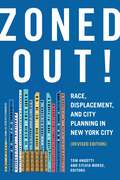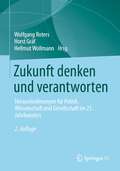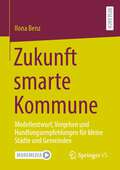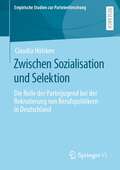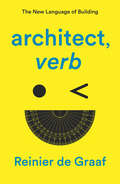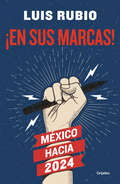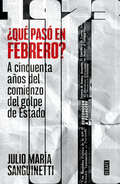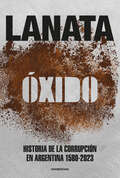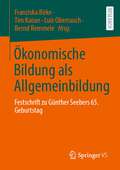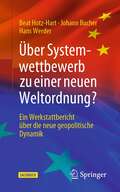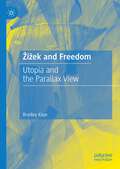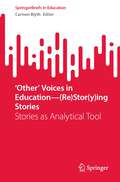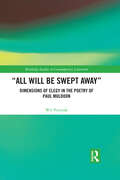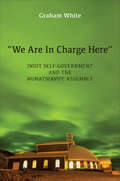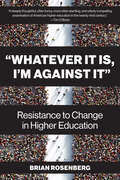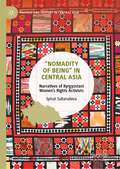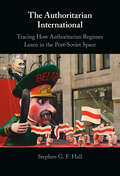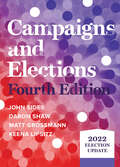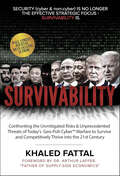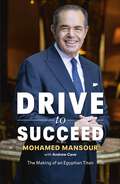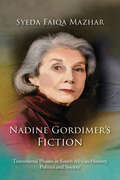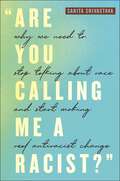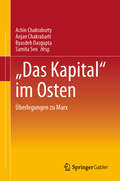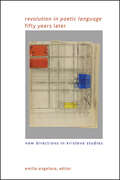- Table View
- List View
Zoned Out!: Race, Displacement, and City Planning in New York City, Revised Edition
by Tom Angotti and Sylvia MorseCommon sense solutions for affordable housing that is truly affordableGentrification and displacement of low-income communities of color are major issues in New York City and the city’s zoning policies are a major cause. Race matters but the city ignores it when shaping land use and housing policies. The city promises “affordable housing” that is not truly affordable. Zoned Out! shows how this has played in Williamsburg, Harlem and Chinatown, neighborhoods facing massive displacement of people of color. It looks at ways the city can address inequalities, promote authentic community-based planning and develop housing in the public domain.Tom Angotti and Sylvia Morse frame the revised edition of this seminal work with a tribute to the late urbanist and architect Michael Sorkin and his progressive and revolutionary approaches to cities as well as a new preface about changes in city policy since Mayor Bill de Blasio left office and what rights citizens need to defend. The book includes a foreword by the late, distinguished urban planning educator Peter Marcuse and individual chapters by community activist Philip DePaola, housing policy analyst Samuel Stein, and both the editors.
Zukunft denken und verantworten: Herausforderungen für Politik, Wissenschaft und Gesellschaft im 21. Jahrhundert
by Hellmut Wollmann Wolfgang Roters Horst GräfDieses Buch untersucht in einem Querschnitt durch aktuelle und künftig zu erwartende Herausforderungen für Politik, Wissenschaft und Gesellschaft (Finanzen, Digitales, Kultur, Stadtentwicklung, Wohnen, Verkehr, Bildung, usw.), ob und unter welchen Bedingungen Staat und Politik in der Lage sind, Zukunft zu denken und – noch wichtiger – zu gestalten. Als Referenzraum und -zeit ziehen zahlreiche Autor*innen die Stadtentwicklungspolitik der 1980er und 1990er Jahre in Nordrhein-Westfalen, vor allem für die Agglomeration Ruhr, heran. In der „Zeitenwende“ wurde der Band vor allem in seiner welt- und europapolitischen Dimension aktualisiert und erweitert.
Zukunft smarte Kommune: Modellentwurf, Vorgehen und Handlungsempfehlungen für kleine Städte und Gemeinden
by Ilona BenzDas Konzept der Smart City wird in wissenschaftlicher, politischer, medialer und projektpraktischer Hinsicht bislang überwiegend in großen Städten bearbeitet. Demgegenüber empfinden kleine, ländlich geprägte Gemeinden den Smart-City-Diskurs überwiegend als fremd. Es mangelt an inhaltlichen Modellentwürfen, Vorgehensmodellen und an kommunale Entscheidungsträger gerichtete Handlungsempfehlungen, die sich am Aufgabenportfolio, den speziellen Rahmenbedingungen und Herausforderungen kreisangehöriger Gemeinden in einer Größenklasse bis 20.000 Einwohner orientieren. Dieses Buch widmet sich diesen Aufgabenstellungen und entwirft erstens ein inhaltliches Modell einer smarten Kommune als Spiegelbild zur smarten Stadt. Zweitens wird in dieser Analyse auf der Grundlage von Erfahrungen baden-württembergischer Pilotkommunen ein schrittweises Vorgehen zur Entwicklung eines individuellen Modells der smarten Kommune für kleine Gemeinden aufgezeigt.
Zwischen Sozialisation und Selektion: Die Rolle der Parteijugend bei der Rekrutierung von Berufspolitikern in Deutschland (Empirische Studien zur Parteienforschung)
by Claudia HülskenDie Jugendorganisationen der Parteien in Deutschland gelten als Sprungbretter für politische Karrieren. Für den politischen Nachwuchs können sie ein Ort der Sozialisation und ein Organisationsrahmen für das Schmieden karriererelevanter Netzwerke sein. Darüber hinaus kann die Parteijugend auch als Bewährungskontext und als Hausmacht von jungen Mandatsinteressierten fungieren. In ihrer Publikation untersucht Claudia Hülsken in einer qualitativen vergleichenden Studie die Funktionen der Jungen Union (CDU) und der Jusos (SPD) für die innerparteiliche Auswahl zukünftiger Berufspolitiker. Im ersten Teil der Arbeit wird die kollektive Rolle der beiden Jugendverbände am Beispiel der Kandidatenselektion zur Bundestagswahl 2013 in Nordrhein-Westfalen und Niedersachsen in den Blick genommen. Der zweite Teil untersucht die individuelle Bedeutung des Parteijugendengagements für politische Karrieren auf der Grundlage biografischer Interviews mit Landtags- und Bundestagsabgeordneten.
architect, verb.: The New Language of Building
by Reinier de GraafThe Hidden Rules of Architecture: how to build world-class, award winning, creative, innovative, sustainable, liveable and beautiful spaces that foster a sense of place and well beingLeading architect Reinier de Graaf De Graaf punctures the myths behind the debates on what contemporary architecture is, with wit and devastating honesty. Architecture, it seems, has become too important to leave to architects. No longer does it suffice to judge a building solely by its appearance, it must be measured, and certified. When architects talk about &“Excellence,&” &“Sustainability,&” &“Well-being,&” &“Liveability,&” &“Placemaking,&” &“Creativity,&” &“Beauty&” and &“Innovation&” what do they actually mean? In architect, verb. De Graff dryly skewers the doublespeak and hot air of an industry in search of an identity in the 21st century. Who determines how to measure a &“green building&”? Why is Vancouver more &“liveable&” than Vienna? How do developers get away with advertising their buildings as promoting &“well-being&”? Why did Silicon Valley become so obsessed with devising &“creative&” spaces or developing code that replaces architects? How much revenue can be attributed to the design of public space? Who gets to decide what these measurements should be, and what do they actually mean? And what does it mean for the future of our homes, cities, planet? He also includes a biting, satirical dictionary of &“profspeak&”: the corporate language of consultants, developers and planners from &“Active listening&” to &“Zoom Readiness.&”
¡En sus marcas! México hacia 2024
by Luis RubioEl juego ya comenzó, los rounds de sombra salieron a la luz y el futuro de México se está definiendo hoy La carrera hacia la Presidencia de la República ha arrancado. Este libro presenta lo que todo ciudadano debe saber para afinar su voto:las claves para entender lo que está pasando, los escenarios que pueden sobrevenir, los problemas que de verdad enfrenta México y los mitos que conviene desechar. Con rigor y mesura —esos bienes tan escasos en elpanorama mediático actual—, Luis Rubio sopesa, entre otros asuntos, las magnas obras emprendidas en los últimos años, delinea las dinámicas económicas que trascienden al sexenio y analiza las ideas de nación que están en liza, el debate en torno al “populismo” o la autocracia,los cambios en las reglas del juego y el nuevo vínculo de México con las potencias mundiales. La obra concluye mirando de frente el fantasma de la reelección, el monstruo desatado de la corrupción y el leviatán de inseguridad que atraviesan México. Como se ve, es cosa de supervivencia prepararse para lo que se nos viene. En sus marcas... ¿Y están verdaderamente listos?
¿Qué pasó en febrero de 1973?: A cincuenta años del comienzo del golpe de Estado
by Julio María SanguinettiMedio siglo después de los incidentes que anunciaron con claridad la inminencia del golpe de Estado, el Dr. Sanguinetti propone un texto clave para iluminar aquel período histórico cuyas resonancias aún nos afectan. Han pasado cincuenta años desde el “febrero amargo” de 1973. Los hechos que entonces se sucedieron mostraron el peor rostro de nuestra democracia, con fuerzas militares en la calle como no ocurría desde 1904. Este medio siglo de perspectiva nos dibuja nítidamente el comienzo del golpe de Estado que se consumaría cuatro meses después. La inédita tensión que se vivió entre el gobierno, la oposición, el Parlamento, los mandos militares y hasta la propia Justicia, configuraron una dura prueba para las instituciones y los actores políticos. Este libro propone una mirada alejada de las teorías interpretativas, que se atenga a “la majestad de los hechos”, al decir de Hanna Arendt, para iluminar un período histórico que aún influye en los debates contemporáneos. Al decir de su autor, el impulso creativo de este texto surge “ante la desconsoladora conclusión de cuántos jóvenes no tenían ni idea del comienzo del golpe de Estado de 1973”. El habitual estilo periodístico del Dr. Sanguinetti, ameno sin perder rigor histórico, se complementa con documentación escrita y gráfica, consolidando un libro fundamental para la comprensión de un hecho clave de nuestra historia reciente.
Óxido: Historia de la corrupción en Argentina 1580-2023
by Jorge LanataUna investigación integral, histórica y periodística de la corrupción argentina a través de cinco siglos: del Virreinato al Olivosgate, Jorge Lanata recorre este proceso imparable de descomposición nacional y lo ilumina a través de una selección sorprendente de casos tanto poco conocidos como notables. Argentina está oxidada. La corrupción es su óxido. Y se extiende cada vez más sobre el país. Creemos verlo, creemos que está a la vista de todos. Pero, según los últimos estudios, solo el 12% de los hechos de corrupción conocidos llegan a la Justicia y solo el 2% recibe algún tipo de condena. Con el correr de los años, la corrupción ha ido cambiando, expandiéndose, perfeccionándose, poniéndose al abrigo de la impunidad. Aunque algo se mantuvo invariable: el rol del Estado. El inventor de la barrera siempre cobró peaje. En esta investigación histórica y periodística, Jorge Lanata recorre este proceso imparable de descomposición nacional y lo ilumina a través de una selección sorprendente de casos tanto poco conocidos como notables, que arrancan cuando Argentina no era todavía una república y llegan hasta hoy, cuando se pregunta si puede volver a serlo. Una radiografía descarnada para contar un país que -de forma deliberada, por omisión o negligencia- ha construido un sistema funcional al fraude, la malversación, la usurpación, el tráfico de influencias y el robo liso y llano. Un sistema en el que es casi imposible investigar y cuando se investiga, no se sanciona. En el que nunca hay funcionarios inocentes ni culpables, sino tan solo sospechosos. Una herrumbre que nos corroe desde siempre y se expande frente a nuestros ojos.
Ökonomische Bildung als Allgemeinbildung: Festschrift zu Günther Seebers 65. Geburtstag
by Bernd Remmele Franziska Birke Tim Kaiser Luis OberrauchProf. Dr. Günther Seeber wird im kommenden Jahr in den Ruhestand eintreten, weshalb wir mehrere Wissenschaftler*innen und Weggefährt*innen eingeladen haben, seine Leistungen im Rahmen eines Beitrags zu einer Festschrift zu würdigen. Wir erwarten hochwertige Beiträge, die neue wissenschaftliche Erkenntnisse rund um das Kernthema „Ökonomische Bildung als Allgemeinbildung“ hervorbringen. Die Einreichungen werden konzeptionell und empirisch ausgerichtet sein sowie unterrichtspraktische Bezüge enthalten.
Über Systemwettbewerb zu einer neuen Weltordnung?: Ein Werkstattbericht über die neue geopolitische Dynamik
by Beat Hotz-Hart Johann Bucher Hans WerderDieses Buch behandelt die gegenwärtig im Gange befindliche Zeitwende in der Weltgeschichte. Die liberale, multilaterale, regelbasierte und weitgehend westlich geprägt Weltordnung ist im Zuge eines aufkommenden neuen Großmächtewettbewerbs ernsthaft ins Wanken geraten. Wirtschaftlich hat sich der Kapitalismus weltweit durchgesetzt, allerdings in unterschiedlichen Ausprägungen: Ein weitgehend hemmungsloser Kapitalismus in den USA, ein sozialpolitisch gebändigter Kapitalismus in Europa und eine Vielfalt unterschiedlicher Kapitalismen in Süd-Korea, Taiwan und Singapur als Beispiele. China verfolgt einen staatlich gelenkten autoritären Kapitalismus. Diese verschiedenen Formen stehen im Wettbewerb miteinander. Politisch bestehen zwischen diesen Nationen grössere Unterschiede. Im zersplitterten Westen sind unterschiedliche liberal-demokratische Regierungsformen vorherrschend. Für China ist die marxistisch-leninistische Kaderpartei mit ihrem autoritären Führungsstil massgebend. Die aktuelle und künftige globale Entwicklung wird durch einen wirtschaftlichen und politischen Systemwettbewerb zwischen China und dem fragmentierten «Westen» geprägt. Die COVID-19 Krise wirkt bei dieser Entwicklung wie ein Brandbeschleuniger und der Ukraine-Krieg verschärft und akzentuiert diese Problematik. Szenarien zeigen drei mögliche neue Weltordnungen.
Žižek and Freedom: Utopia and the Parallax View
by Bradley KayeThis book is an exploration of Žižek's theory of freedom. By examining key passages in Žižek's work the aim is to provide a functional, serviceable philosophy of power and ideology and show how this philosophy of power relates to freedom. Although some, like Noam Chomsky, have criticized Žižek's work as having no guiding principles, it is suggested that this misses the fact that Žižek's philosophy utilizes a dialectical methodology that often appears contradictory. Though a highly astute reader with a background in the philosophical texts he frequently cites (the German Idealists, Freud, and modern philosophers), it becomes clear that there is a uniquely Zizekian philosophy that mobilizes a radical hermeneutics of freedom.
‘Other’ Voices in Education—: Stories as Analytical Tool (SpringerBriefs in Education)
by Carmen BlythThis book explores how stories can be used as ‘data’ that prefigure and make possible the numerous permutations of life that comprise existence, and examines how stories can be reconfigured to transform that existence into something 'other'. It uses varied theoretical and critical frameworks such as autoethnography and posthumanism with which to explore the stories shared that go ‘beyond cause and effect’. This book looks to engage with storying and storytelling as inquiry in non-Western ‘worlds’, and looks to make ‘storying’, ‘restor(y)ing’, and ‘stories’ written by non-Western educators the locus of attention. By doing so, it seeks to illustrate what distinctive ways of storying and storytelling can look like in worlds other than those that follow a Western ethico-onto-epistemological worldview. It provides a way to articulate thought that may be commonly omitted in teacher education around the world, and looks at ‘truth’ as situated rather than as totality, local rather than global, with stories used to problematize subject/object positionings within those same stories.
“All Will Be Swept Away”: Dimensions of Elegy in the Poetry of Paul Muldoon (Routledge Studies in Contemporary Literature)
by Wit PietrzakThe book offers the first comprehensive study of Paul Muldoon’s mourning verse. Considering not only the celebrated elegies like "Yarrow," "Incantata" or "Sillyhow Stride" but also the elegiac impulse as it develops throughout Muldoon’s entire work, All Will Be Swept Away charts a large swathe of Muldoon’s poetic landscape in order to show the complexity with which he approaches the themes of death and mourning. Using archival material as well as a vast array of theoretical apparatuses, the book unveils the psychological, literary and political undertones in his poetry, all the while attending to the operations of the poetic text: its form, its music and its capacity to console, warn and censure.
“We Are in Charge Here”: Inuit Self-Government and the Nunatsiavut Assembly
by Graham WhitePowerful, innovative Indigenous self-governance regimes are increasingly important players in Canadian politics, but little academic work has been done on their structure, operation, and effectiveness. "We Are In Charge Here" examines the central institution of the most populous Indigenous self-governance regime in Canada, the elected Assembly of the Nunatsiavut Government. Nunatsiavut – "our beautiful land" in Inuktitut – was established in 2006 by a modern treaty between the Labrador Inuit and the Canadian state. Graham White offers a thorough observation of the Assembly, based on interviews with Assembly members and others involved in Nunatsiavut politics, observation of Assembly sessions, and a review of official documents, in order to provide a comprehensive picture of the Assembly, its members, and its operations. The book examines the Assembly’s effectiveness in performing traditional legislative functions such as representation, policy making, and accountability. It addresses key concerns including executive-legislative power relations, Inuit influence on Assembly operations, and the Assembly’s role in realizing self-government. Illuminating the intersection of Indigenous self-governance approaches and Western institutions, "We Are In Charge Here" will be of interest to political leaders, legislative officials, and academics concerned with the design and on-the-ground functioning of Indigenous self-government.
“Whatever It Is, I’m Against It”: Resistance to Change in Higher Education
by Brian RosenbergAn invigorating work that identifies obstructions to transformative change in higher education and offers paths to break through. In &“Whatever It Is, I&’m Against It,&” president emeritus of Macalester College Brian Rosenberg draws on decades of higher education experience to expose the entrenched structures, practices, and cultures that inhibit meaningful postsecondary reform, even as institutions face serious challenges to their financial and educational models. A lively insider&’s account, the book pinpoints factors that hinder the ability of U.S. colleges and universities to be creative and entrepreneurial amid calls to improve affordability, access, and equity for students. Through pithy personal stories of divisive town hall meetings, multiyear college governance battles, and attempts at curricular reform, Rosenberg illustrates internal and external dynamics that impede institutional evolution. Pressures such as declining enrollment, escalating costs, and an oversupply of PhDs in academia have long signaled a grave need for reform within a profession that, as Rosenberg ruefully acknowledges, lacks organizational flexibility, depends greatly on reputation and ranking, and retains traditions, from the academic calendar to grading systems, that have remained essentially the same for decades. Rosenberg looks outside the U.S. system to find possible antidotes in innovative higher education models such as student-centered and experiential learning approaches. This thought-provoking work offers ample evidence for presidents, chancellors, deans, provosts, and faculty to consider as they plan their missions to achieve institutional transformation.
”Nomadity of Being” in Central Asia: Narratives of Kyrgyzstani Women’s Rights Activists (Politics and History in Central Asia)
by Syinat SultanalievaThis book offers a new framework for understanding feminism and political activiism in Kyrgyzstan, “nomadity of being. ” Here, foreign information and requirements, even forced ones, are transformed into an amalgamation of the new and the old, alien and native—like kurak, a quilted patchwork blanket, made from scraps. Conceptualizing feminist narratives in Kyrgyzstan, while keeping in mind, the complex relationship between ideological borrowing, actualization, appropriation or self-colonization of “feminist” concepts can expand both scholarly and activist understanding of specificities of post-Soviet feminisms from a historiographic point of view. Kurak-feminism is feminism that is half-donor-commissioned, half-learned through interactions (personal, media, academic, professional), unashamed of its borrowed nature and working toward its own purpose that is being developed as the blanket is being quilted. Weaving in elements from completely different and, to a Western eye, incompatible approaches nomadity of being might pave the way toward a Central Asian reframing of non-Western feminisms. This provocative text will interest scholars of European politics, the post-Soviet sphere, and feminists.
The Authoritarian International: Tracing How Authoritarian Regimes Learn in the Post-Soviet Space
by Stephen G. HallStephen Hall argues that democracies can preserve their norms and values from increasing attacks and backsliding by better understanding how authoritarian regimes learn. He focuses on the post-Soviet region, investigating two established authoritarian regimes, Belarus and Russia, and two hybrid-regimes, Moldova and Ukraine, with the aim of explaining the concept of authoritarian learning and revealing the practices that are developed and the sources of that learning. Hall finds clear signs of collaboration between countries in developing best survival practices between authoritarian-minded elites, and demonstrates that learning does not just occur between states, rather it can happen at the intra-state level, with elites learning lessons from previous regimes in their own countries. He highlights the horizontal nature of this learning, with authoritarian-minded elites developing methods from a range of sources to ascertain the best practices for survival. Post-Soviet regional organisations are crucial for the development and sharing of these survival practices as they provide 'learning rooms' and training exercises.
Campaigns and Elections (Fourth Election Update Edition): 2022 Election Update
by Matt Grossmann John Sides Keena Lipsitz Daron ShawThe #1 book examines contemporary campaigns and elections—now updated through 2022. Thoroughly revised and updated through the 2022 elections, the Fourth Edition of Campaigns and Elections uses a consistent framework to reveal the strategies and choices that face candidates and other practitioners in the American political system. The authors help students answer the many questions they have about campaigns while spotlighting contemporary political science research in the process. This purchase offers access to the digital ebook only.
Survivability: Confronting the Unmitigated Risks & Unprecedented Threats of Today’s Geo-Poli-Cyber™ Warfare to Survive and Competitively Thrive into the 21st Century
by Khaled FattalToday, safeguarding nation-states, organizations, and citizens has less to do with security (cyber and non-cyber) but has everything to do with Survivability.We are now in the 'Era of the Unprecedented': since 2010, Geo-Poli-Cyber™ warfare has been increasing in intensity. The motivation of its perpetrators is often driven by political, ideological, ‘religious’ and extremist objectives, rather than financial gain. Many top decision makers and citizens are unaware of this reality or the implications it has on their sovereignties, businesses, lives and livelihoods, and most do not know how to mitigate it. This trend has seen governments and businesses constantly breached by high-impact cyberattacks, confirming the ineptitude of best in class cyber security strategies, solutions, policies and procedures. Yet, they continue implementing what they know is failing and ineffective.The 2020 pandemic revealed a fundamental flaw in many Western democratic nations; their failure to appropriately prepare for a threat they knew was coming and the cost of this in human lives. This pandemic has shed light on the weaknesses of the current international order and economic, political, legal and democratic models and structures that enable it. It has also called into question the capacity of existing cyber security protocols and designs to protect nations, companies and citizens. The question remains: are governments ready for cyber terrorism, election meddling, fake news and the malicious use of artificial intelligence and quantum computing? How about them all happening at the same time? Survivability provides potential answers to this and other pressing concerns.
Drive to Succeed
by Andrew Cave Mohamed MansourMohamed Mansour has spent his life fighting adversity. Born in Egypt in the post-war period, his childhood was halted abruptly when, aged ten, he almost lost a leg in a devastating car accident. At 18, he had to support himself through college in the US when his family's assets were seized by the Egyptian government. Aged 20, he fought cancer. Then, at 25, he returned to Egypt to help revive the fortunes of his family's once thriving business group as it steadily diversified into sectors from automobiles to construction equipment, fast food to venture capital.Almost five decades on, he and his family stand at the helm of some of the largest companies in North Africa and the Middle East. They have partnered with global brands from General Motors and Caterpillar to McDonald's and invested early in Silicon Valley successes such as Facebook, Uber and Airbnb. He also served as Egypt's Transport Minister from 2005 to 2009.Filled with hard-won wisdoms, Mohamed Mansour's inspirational story demonstrates the importance of learning from experience and never giving up in the drive to succeed.
The Natchez Burning Trilogy: A Penn Cage Collection Featuring: Natchez Burning, The Bone Tree, and Mississippi Blood (Penn Cage)
by Greg Iles“A superb entertainment that is a work of power, distinction and high seriousness.” – Washington PostFrom #1 New York Times bestselling author Greg Iles come the widely acclaimed Natchez Burning trilogy, featuring Penn CageNatchez BurningRaised in Natchez, Mississippi, Penn Cage learned all he knows from his father, Dr. Tom Cage. But now Tom has been accused of murdering the Black nurse with whom he worked in the 1960s and Penn is determined to exonerate him. The quest for answers leads down a trail of corruption and brutality that places Penn’s family squarely in the crosshairs of the Double Eagles, a vicious offshoot of the KKK controlled by some of the state’s most powerful men. Penn ultimately must acknowledge that secrets from his father’s past have put the Cage family in great jeopardy. The Bone TreePenn Cage’s family is in crisis, has inadvertently started a war with an offshoot of the KKK called the Double Eagles, and his fiancée, journalist Caitlin Masters, is chasing the biggest—and most dangerous— story of her career. The only path out of this chaos is taking on the powerful men behind the Double Eagles, who are hiding a secret legacy darker than anything Penn can imagine. All roads lead to the Bone Tree, a legendary killing site that conceals far more than the remains of the forgotten—and where the shadow of personal tragedy threatens all Penn holds dearest. Mississippi BloodPenn Cage is shattered by grief and dreaming of vengeance. The woman he loves is gone, and his father Dr. Tom Cage is about to be tried for murder. When Tom stubbornly refuses to speak in his own defense, Penn joins forces with Serenity Butler, a famous young Black author who has come to Natchez to write about his father's case. Together, Penn and Serenity battle to discover the secret history of the Cage family and the South itself, a desperate move that risks the only thing they have left to gamble: their lives.
Nadine Gordimer's Fiction: Transitional Phases in South African History, Politics and Society
by Syeda Faiqa MazharNadine Gordimer’s Fiction is a major study of the life and writings of Nadine Gordimer, a towering figure in the literary and cultural life of South Africa in the late 20th and early 21st centuries, recognised for her fiction through several prizes, most notably the 1991 Nobel Prize for Literature. It has the makings of a guide, taking the reader through the complexities in Gordimer’s life, literature, and society, backed by academic research (doctoral and postdoctoral) and informed by Dr. Mazhar’s study visit to South Africa, including a face-to-face interview with Gordimer. The reader gets a rich picture mediated by the author’s own intellectual journey from Pakistan – the country of her birth – and the United Kingdom. Dr. Mazhar maps the complexities of colonialism in South Africa and beyond in different forms, most notably in the legislated discrimination based on race/ethnicity, Apartheid (1948–1994). Covering the literary writings and political activism of Gordimer both during and after Apartheid, the book provides the reader with a detailed account of individual works of fiction, and vistas of critical thought and action that serve as their source and backdrop. Dr. Mazhar draws on the cultural theories of Homi Bhabha, especially on the notion of The Third Space, a fictional space/borderland between social and political polarisations, which allows for reflection, refinement, and re-action that is transformational and psychologically uplifting. She demonstrates that Gordimer takes her characters through such spaces, which allow for a transformational experience that leads to perspectives/realisations that were missing as a result of constraints that were externally imposed by law and tradition and interiorised as a survival mode. Dr. Mazhar concludes that Gordimer gracefully articulates her vision for a world free of complexities, which one must strive for. Although the book presents the academic analysis of Gordimer‘s fiction and the memoir as separate parts, there are organic connections between the two, which link the social ethos, political struggles, varied ideological perspectives, and ethnic and trans-ethnic identities from which Gordimer draws her subjects and their lives and depicts them through appropriate narrative techniques. Nadine Gordimer’s Fiction is a welcome addition to books on author studies, literary criticism, and South African culture and society. It offers excellent material for both academic and non-academic readers. The style of writing used in the book is clear and simple, yet powerful. This can help the reader to appreciate the enormous achievement of Gordimer, which has established her as a major literary figure in South Africa and beyond. Dr. Balasubramanyam Chandramohan PhD (Shef), FHEA, Senior Research Fellow, Institute of Commonwealth Studies, School of Advanced Study, University of London
"Are You Calling Me a Racist?": Why We Need to Stop Talking about Race and Start Making Real Antiracist Change
by Sarita SrivastavaShows why diversity workshops fail and offers concrete solutions for a path forwardDespite decades of anti-racism workshops and diversity policies in corporations, schools, and nonprofit organizations, racial conflict has only increased in recent years. “Are You Calling Me a Racist?” reveals why these efforts have failed to effectively challenge racism and offers a new way forward.Drawing from her own experience as an educator and activist, as well as extensive interviews and analyses of contemporary events, Sarita Srivastava shows that racial encounters among well-meaning people are ironically hindered by the emotional investment they have in being seen as good people. Diversity workshops devote energy to defending, recuperating, educating, and inwardly reflecting, with limited results, and these exercises often make things worse. These “Feel-Good politics of race,” Srivastava explains, train our focus on the therapeutic and educational, rather than on concrete practices that could move us towards true racial equity. Inthis type of approach to diversity training, people are more concerned about being called a racist than they are about changing racist behavior.“Are You Calling Me a Racist?” is a much-needed challenge to the status quo of diversity training, and will serve as a valuable resource for anyone dedicated to dismantling racism in their communities, educational institutions, public or private organizations, and social movements.
"Das Kapital“ im Osten: Überlegungen zu Marx
by Samita Sen Anjan Chakrabarti Achin Chakraborty Byasdeb DasguptaDieses Buch verfolgt einen marxistischen Ansatz mit dem Schwerpunkt auf der Klasse, um über Marx' Kapital im Kontext des Ostens nachzudenken. Es nimmt eine kritische Neubewertung einiger vertrauter Konzepte im Kapital vor und arbeitet Themen heraus, die an dessen Rand liegen. In verschiedenen Aufsätzen wird dieses Grenzgebiet erkundet, um neueKonzepte und Analysemethoden für Marx' Abhandlung im 21. Jahrhundert zu fördern. Jahrhundert voranzutreiben. Damit stellt es einen Fortschritt in der Marxschen Theorie und Politik dar.Das Buch untersucht das Kapital von Marx aus der Perspektive und dem Blickwinkel des Ostens und konzentriert sich auf viele Themen, die an den "Grenzen" des Kapitals liegen, das sich hauptsächlich mit der Entschlüsselung des entwickelten Kapitalismus befasst. Es werden neue Konzepte eingeführt und in Beziehung zu den von Marx vertretenen gesetzt, um unser Verständnis von Wirtschaft, Kapitalismus, Entwicklung und Politik zu verbessern. In dieser Hinsichtbietet das Buch eine Lesart des Kapitals, die sich von den herkömmlichen Überlegungen in der westlichen Welt unterscheidet.Der Umfang ist groß und deckt einen großen Teil des Gebiets von Marx' Kapital ab, wobei auch einige neue Themen im Zusammenhang mit dem Kapital behandelt werden. Der Inhalt gliedert sich in die folgenden Abschnitte: Rezeption des Kapitals im Osten; Wert, Ware, Mehrwert und Kapitalismus; Bevölkerung und Rente im Kapital; und Fragen jenseits des Kapitals.
"Revolution in Poetic Language" Fifty Years Later: New Directions in Kristeva Studies (SUNY series in Gender Theory)
by Emilia AngelovaIn her 1974 Revolution in Poetic Language, Julia Kristeva resisted the abstract use of language, with its aim of totalization and finality, in all its colonizing and alienating forms. A major thinker and critic, Kristeva reappropriated Hegel's concepts of desire and negativity, in conjunction with the thought of Heidegger, Arendt, Freud, and Lacan, to revolt against modernity's culture of nihilism and the West's inability to deal with loss. This collection celebrates the fiftieth anniversary of Revolution in Poetic Language by revisiting Kristeva's oeuvre and establishing exciting new directions in Kristeva studies. Engaging with queer and transgender studies, disability studies, decolonial studies, and more, renowned and rising scholars plot continuities in—and push the boundaries of—Kristeva's thinking about loss, revolution, and revolt. The volume also includes two essays by Kristeva, translated into English for the first time here—"The Impossibility of Loss" (1988) and "Of What Use Are Poets in Times of Distress?" (2016).
